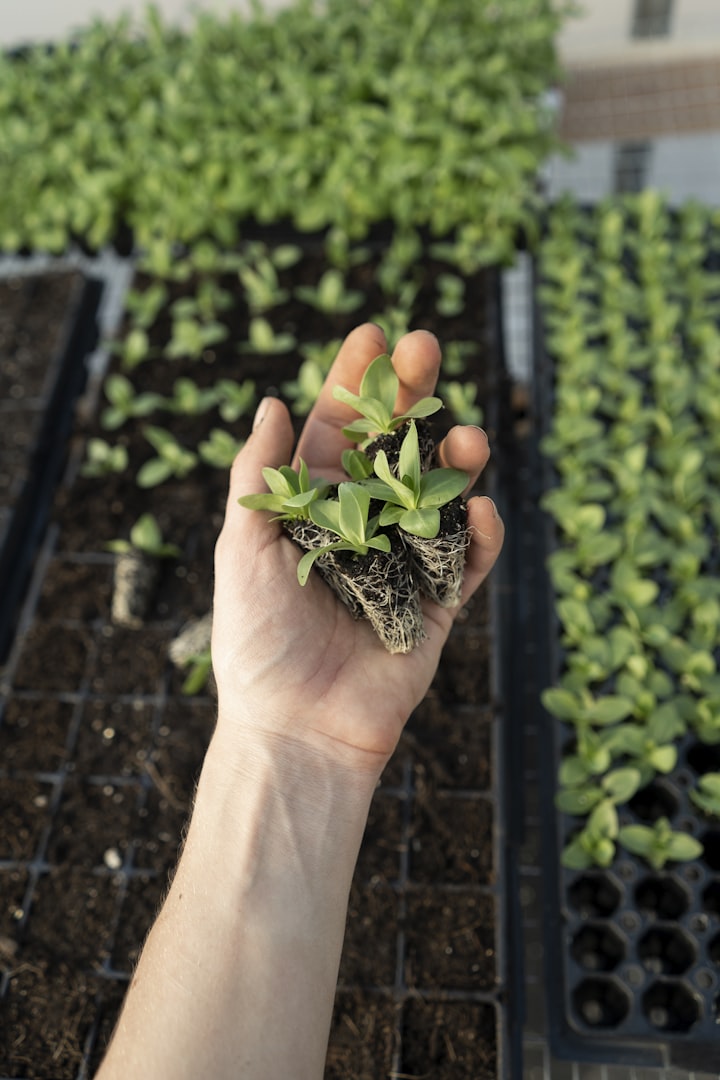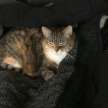Oral History
Sometimes You Need a New Job

My mother Susan told me that there was a time, less than a century ago, when food was purchased in stores with pieces of paper or tiny plastic cards. My mother Karen says Susan is full of it and that never really happened. Then Susan says Karen would remember her history lesson of what it was like before if she didn’t spend all her harvest on whiskey. That’s usually my cue to go out to the greenhouse and work on my plot. The vegetables never get drunk and argue.
In Karen’s defense, some of the things Susan says seem hard to believe. She says people once paid different prices for food based on whether it was organic or not. What’s organic? I asked once, when I was younger. She couldn’t remember, just that it was something people with more of the paper ate and something people with less paper wanted to eat. She said people used to raise animals just to eat them, that the fish in the oceans used to be safe to eat, and that when she was very young, people used to go to something called all-you-can-eat buffets. That was the hardest of all her stories to believe.
Really, sir? I would have never guessed that was true.
Karen told me once when she was very drunk and reminiscing that when she was a child there was so much food people would throw away the extra at the end of the meal. The idea of there being extra seems unbelievable, almost like one of Susan’s stories. I knew she was pulling my leg when she said there used to special recipes for using up leftovers. Leftovers. It’s an interesting word, don’t you think, sir?
Oh, you’ve heard it before?
Right, so back to the main question. Tell me about yourself is kinda vague, don’t ya think? I mean what do you want to know exactly? My mothers agree that in the before, children went to school to learn things. Now, since the only thing we need to learn is how to get more food, most of my friends don’t even know how to read. Karen said I should be sure to mention that I can read, that it might help me get the job. Anyway, the families that have enough food to have kids start teaching them to plant or to maintain the greenhouse as soon as they can walk. Personally, I always wanted a little sister, but there was barely enough food for the four of us.
Yes, four. My mothers, my father and I. Susan says the situation would have been consider amoral back in the before, but she also said there were people then who really believed Jesus managed to convert a couple loaves of bread and pieces of fish into enough food for hundreds of people. If it’s true, I’d sure like to see a miracle like that today. I’ve never had fish. We had dog once, for my father’s birthday I think. He made some terrible joke about it not being what he meant when he’d asked for a dog. He was already losing his mind by then. Susan called the disposal team just a couple weeks later. All he left behind was his books and that damn heart-shaped locket.
Karen says I started reading when I was really young. Before I could learn to tend my own plot, she and Susan had to take turns taking care of me, so they read me books to distract me. Karen said that most of the books for children were gone at that point. Early after the famine started, some fool decided you could eat stew made from books. Much like the bark stripped from the trees and the food-scented candles, the book stew left people feeling a little less hungry, but didn’t provide them with any nutrients, so they starved to death anyway. Karen said that was before the dark days when the president told people it was okay to eat the dead, so long as they didn’t eat the brain. She said it was happening anyway, so making it legal was something of a formality. Of course, you know what happened there. Turns out that humans generally don’t like to eat one another with good reason. First, most of the people who were being eaten starved to death, so they weren’t very nutritious. Second, for everyone who lived in the before, it felt wrong. And third, turns out we carry all kinds of bacteria that make e. coli and what they used to call food-borne illnesses look downright friendly. Those who ate people with any regularity got sick, real sick; at least they died quicker than those who starved to death.
Susan denies it and Karen won’t talk about it, but I think my dad ate people, at least for a little while. When I asked if that was why he went crazy, Karen just shook her head. Later she told me his insanity is another way the past haunts us. People can’t let go. She said my father was a university professor before the famine and that his mind needed something more than plowing the fields and tending the vegetables. It was his books she and Susan read to me when I was young. Dad tried to tell them I was too young for Cervantes and Dante and Shakespeare, but Karen told him that they would make do with what they had.
Why do I want the job? Well, that’s a pretty easy one, honestly.
I’m afraid I might be like Dad. Oh, I’m much better at raising winter squash than he ever was and I can dry vegetables and can fruit with the best of them. I can remake old clothes into something warm for the winter, piece together quilts, and build a fire without sacrificing the pages of my books to do it, but those are the things I do to survive. I want to do something bigger, something grand, something to change the world.
Are you laughing at me?
Why is so strange that I want to make the world a better place? Susan says…
What do you mean you don’t care what Susan says? Karen says maybe I shouldn’t try to get this job anyway, that you’re all probably mad. After all, who would waste perfectly good food keeping alive a bunch of animals with no practical purpose? Sure, if you’re rich enough to be able to feed a horse, having one to help with the plowing is nice, but what good is a lion? And how on earth do you find enough food for one?
Oh, that’s what the disposal team does with the insane? I didn’t know that. I guess I just thought they disappeared, maybe got shot and then buried like in the days before the famine.
What do I think the job involves? Well, that wasn’t precisely clear. You know how word travels through the grapevine. Susan heard it from Bekkah who works next to her at the community garden who heard it from her husbands who couldn’t say who exactly they heard it from, but maybe it was one of the brewers at the still. I guess I hoped that maybe if you could afford to keep an animal like that, you’d have enough food to pay someone to read or think. Or maybe you had people already working on thinking about why all the crops died the same year and you needed help making people understand what went wrong. Karen says she thinks it had to do with the bees. The bees had been dying off for years; she said some people blamed pesticides but that it might have been more than that. Susan says it was all the genetic manipulation of the crops by some big company. Personally, I think it just happens sometimes. Maybe it’s the planet’s way of dealing with overpopulation. Swift wrote his Modest Proposal after the harsh winters and potato famine in Ireland, right? Susan’s says Swift’s essay was once considered absurd satire, too inhumane to ever be considered. Karen says the people who thought that probably never experienced real starvation.
Did you know that obesity was once an epidemic in this country, sir?
Susan says, and Karen admits she’s right, that before the famine people used to try to be thin enough that their ribs showed, that they would even take computers and alter the way people looked in photographs to make them look thinner. And, Karen says this isn’t true, but Susan says that people used to argue about what food was good for you and what food made you fat. They paid more of the paper, money they called it, to go to buildings where they could run on a machine or lift weights. They needed to, Susan says, because they all worked in offices instead of farms and because they had so much to eat. It would be a nice problem to have, don’t you think, sir?
My memory, sir? It’s excellent. I can recall in vivid detail the stories that my mothers tell me, the things I hear while working in the gardens, the books that I’ve read.
Yes sir, I’ve heard stories about computers, about a time when everyone had one and carried them around in a pocket to send messages to friends and family, to listen to music and to search something they called the internet. I’ve seen the husks of the ones they use for the container gardens in the spring. It seems that most electronics have become part of the trash heap at the edge of town, or containers for gardening.
You have one that works? But what about electricity? The power lines stopped working long before I was born.
You have solar panels? Okay then.
So, my job would be to talk to people – anyone and everyone – about before the famine and then come back here and write it down in the computer. And you can really afford to pay me to do this?
Ten meals a week is a generous offer. And I can use them myself or share them with my mothers?
Why? Well, Susan was a teenager when the famine began. That makes her nearly 60 years old now. There are weeks when it is very hard for her to earn her meals. I know it’s sentimental of me, but I’m not ready to call the disposal team just yet. I don’t want to see her starve either. Karen is slowly starving to death, but that is her choice. She chooses to trade her meals for whiskey.
Would it be okay if I did some of my interviews while working at the gardens? If I keep up my work there and my own plot in the greenhouse, I should be able to save up some meals for when this job ends.
You don’t think it will ever end? I’d like to hope you are right, but sir, you aren’t a young man. What happens when the disposal team comes for you?
No sir, I didn’t realize that the job wasn’t working for you directly.
Yes, perhaps I thought you were a bit eccentric, but if you have the food to do it, who am I to complain?
A university, sir? Like the one my father taught at? That seems like a wonderful job and what exactly is my position to be called?
Historian, huh? It has a nice ring to it.
Yes, I can start work immediately.
About the Creator
LUCINDA M GUNNIN
Lucinda Gunnin is a commercial property manager and author in suburban Philadelphia. She is an avid gamer, sushi addict, and animal advocate. She writes about storage and moving, gaming, gluten-free eating and more. Twitter: @LucindaGunnin






Comments
There are no comments for this story
Be the first to respond and start the conversation.